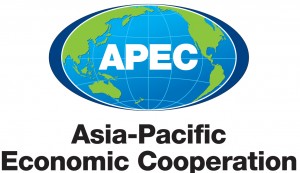 Yesterday, I spoke before the Human Resource Development Working Group of APEC – the Asian Pacific Economic Cooperation in Chicago. APEC is celebrating its 20th year and is comprised of countries that touch the Pacific Ocean. As the host country, the United States representative (Alan Ginsburg from the U.S. Department of Education) got to select the special focus topic of which I spoke about – new models of CTE. I shared information and resources about career clusters.
Yesterday, I spoke before the Human Resource Development Working Group of APEC – the Asian Pacific Economic Cooperation in Chicago. APEC is celebrating its 20th year and is comprised of countries that touch the Pacific Ocean. As the host country, the United States representative (Alan Ginsburg from the U.S. Department of Education) got to select the special focus topic of which I spoke about – new models of CTE. I shared information and resources about career clusters.
The purpose of my presentation was to juxtapose what the US is doing related to programs of study and career clusters against many other countries, like Singapore, which are moving more in the direction of deliberating tracking students and taking “non college” bound students or the bottom 25% and giving them skills needed by the country’s economy. New Zealand shared their national competency model/framework, which is comprised of national standards, stackable competency assessments that allow a student to test out of a competency at any time – not limited to end of course, program or any other timeframe.
China also spoke on my panel. Interesting, they are adopting a sort of clusters’ approach with 8 groups of occupations that break down into 66 subindustry groups/pathways, 400 career areas and 2028 jobs. As a country, they are investing heavily in transition their workforce from being predominantly unskilled (66.3% or 194,000,000) to a more skilled technician level workforce (currently 6.2% of their workforce of 18,100,000). In addition, they have a national strategy to “migrant†nearly 9 million rural workers to the cities and engage them in the industrial workforce.
I have read about global competition (Friedman’s The World Is Flat) but this meeting really brought it home for me. Countries from the Phillipines, Korea, Thailand and Malaysia to New Zealand and Australia or Peru and Chile are investing heavily, in many cases making it a national priority, to build a technically literate, competitive, flexible workforce. They are talking about national standards, national assessments, and portable credentials. Conversations we in the United States have been having for years. And while our system is more locally governed, I had to ask myself whether our competitiveness is being challenged by our willingness to let a thousand flowers bloom. Will the common standards movement get us to where we need to be? Does the American public really believe global competition is real? I know I do.
Tags: global competition

